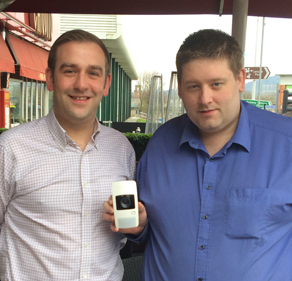4i Security reports sales of its video alarm verification have risen 400 per cent over the last quarter due to customer upgrades and new business. The new product, using technology from UTC Fire & Security, gives users video-verified alarm protection for little more than the cost of a non-video alarm, according to the developers.
It’s claimed to improve speed and effectiveness of response by eliminating false alarms and avoiding police non-attendance which as the firm points out is a persistent problem with traditional alarms.
Matthew Brough, Technical Director of 4i Security, says that the system is ‘selling itself’: “Most alarm systems simply don’t give the protection that people think they are getting when they buy them. People presume that because their system is registered with the police that they’ll get a response. They don’t realise that this might not be the case. We are pointing out that if a jewel vault containing £300m didn’t get a response [Hatton Garden safe deposit centre in London], what can the average commercial site or sports club expect?”
Having seen sales increase from four figures last year to over six figures during the last quarter for video verification product lines, and margins improve by 21pc, 4i is now pressing ahead with promoting to commercial users. Its message is that users should upgrade from less effective sequential alarm systems; and that in some locations UTC’s PIR-cameras can be used where CCTV monitoring isn’t suitable. UTC is working with 4i to expand the technology, increasing the number of PIR-cameras per system from eight to 16, and in due course to 32.
Matthew Brough says: “Sixteen cameras doesn’t sound like a lot but if you are running a 40 zone traditional system, 16 video verified zones are more than capable of the same coverage and being wireless, it gives you a lot of flexibility.” The time-lapse images captured the PIR-camera devices mean that they can also be used in areas where CCTV cameras can’t, he argues. “It’s important to understand that the camera is turned off until the alarm system itself activates. This means that it can be used in sensitive areas where cameras can’t normally be placed, due to privacy.”
The picture quality is “good enough to verify but not to spy”, he says. For example, the devices don’t have the resolution to read documents on desks or noticeboards but they do show the faces and clothing of intruders. “We have some customers who do sensitive work and don’t allow CCTV – but they do now have our new PIR-cameras.”
The dual path solution is EN50131 Grade 2 compliant and BS8243 compliant. UTC’s awarded 4i Security ‘Platinum Partner’ status across intruder, video, fire, access control and fibre specialisms – the first installer to have achieved such recognition.
Mick Thorpe, General Manager of Dewsbury District Golf Club in West Yorkshire , praises 4i for its partnership approach. He says he is actively recommending the company to other clubs. “We now have a much safer and better protected clubhouse and outbuildings. We are kept informed of changes in legislation, initiatives and technology that enables us to make decisions going forward.”
Pictured are Matthew Brough, of 4i (right) with Nick Latham of UTC Fire & Security.
Visit www.4isecurity.co.uk.









